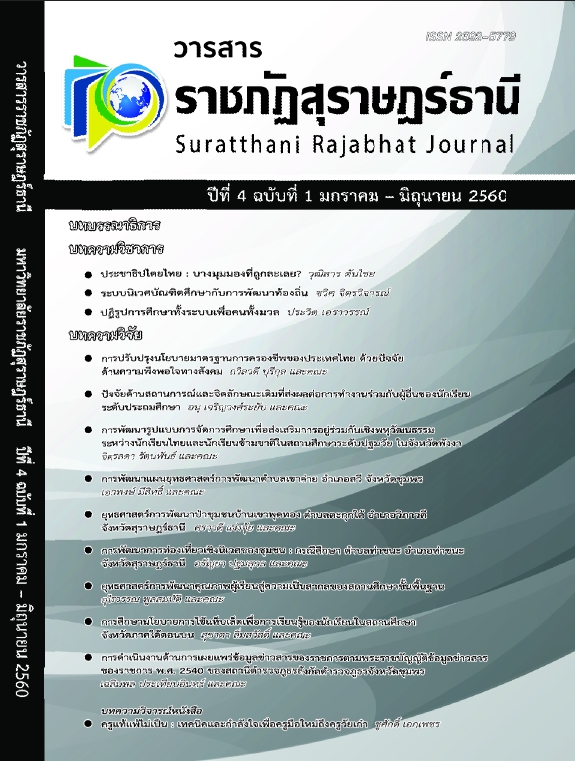The Strategies of Internationalized Learner Quality Development of Basic Education Schools
Main Article Content
Abstract
The objectives of this research were to identify indicators for internationalized learner quality and to propose strategies of internationalized learner quality development of basic education schools. The research procedure consisted of two phases as follows: Phase 1 indicators requirement and concordance of internationalized learner quality development of Basic Education Schools were conducted. Relevant documents, schools philosophy, theories, and relevant research studies were reviewed. While, the concordance indicators were investigated by using a screening form and an interview with 17 experts, and primary factors of internationalized learner quality development of basic education schools by using an exploratory and confirmatory factors analysis in the statistical package program. Phase 2 proposals of strategies of internationalized learner quality development of basic education schools were conducted to monitor by connoisseurship with seven experts. Then, the instrument was the assessment form for strategies of internationalized learner quality development. Data were analyzed by using content analysis, mean, and standard deviation.
The research findings were as follows: the total number of the appropriate indicators was 53, with seven factors which were 1) academic knowledge, 2) information and technology skills, 3) communication skills, 4) thinking skills, 5) problem-solving skills, 6) life skills, and 7) desirable characteristics; the concordance value for the confirmatory factor analysis was correlated with the empirical data. The finding also indicated three strategies of internationalized learner quality development in basic education schools namely: 1) learner quality development for excellence, 2) learner skills development, and 3) learner development to achieve desirable characteristics as world citizen. In addition, these three strategies were highly considered appropriate to use at both overall and individual levels high.
Article Details
References
กระทรวงศึกษาธิการ. (2557) รายงานการติดตามและประเมินผลการจัดการศึกษา ตามนโยบายด้านการศึกษาของรัฐบาลปี 2556 กรุงเทพฯ : สำนักงานเลขาธิการสภาการศึกษา.
จักษวัชร ศิริวรรณ. (2554). ตัวแบบการประเมินโครงการ : ตัวแบบซิป (CIPP Model). (Online) สืบค้นได้จาก https://www.gotoknow.org. [2558, ธันวาคม 21).
ดนัย จันทร์เจ้าฉาย. (2554). ธรรมดีที่พ่อทำ. กรุงเทพฯ : ดีเอ็มจี.
ปองสิน วิเศษศิริ. (2550). การกระจายอำนาจทางการศึกษาของประเทศสหรัฐอเมริกา. กรุงเทพฯ : สำนักงานเลขาธิการสภาการศึกษา.
เพชรยุพา บูรณ์สิริจรุงรัฐ. (2558). หลักการพัฒนาความฉลาดทางสังคม. กรุงเทพฯ : เฌ.เดียมอง.
ไพฑูรย์ สินลารัตน์ และคณะ. (2550) . สัตตศิลา หลักเจ็ดประการสำหรับการเปลี่ยนผ่านการศึกษาเข้าสู่ยุคเศรษฐกิจฐานความรู้ (พิมพ์ครั้งที่ 2). กรุงเทพฯ : โรงพิมพ์แห่งจุฬาลงกรณ์มหาวิทยาลัย.
วรัยพร แสงนภาบวร. (2550). รายงานการวิจัยเรื่องการกระจายอำนาจทางการศึกษาของประเทศญี่ปุ่น. กรุงเทพฯ : พริกหวานกราฟฟิค.
วิทยากร เชียงกูล. (2553). สภาวะการศึกษาไทย ปี 2552 – 2553 “จะปฏิรูปการศึกษา ให้เกิดผลจริงได้อย่างไร”. (Online) สืบค้นได้จาก : http://edu.kru.ac.th. [2557, เมษายน 18].
. (2555). รายงานสภาวะการศึกษาไทย 2554-2555. (Online) สืบค้นได้จาก : http://www.bangkokbiznews.com. [2557, เมษายน 18].
วรพจน์ วงศ์กิจรุ่งเรือง และอธิป จิตตฤกษ์. (2554). ทักษะแห่งอนาคตใหม่ การศึกษา เพื่อศตวรรษ ที่ 21. แปลจาก 21st Century Skills: Rethinking How Students Learn. กรุงเทพฯ : โอเพนเวิร์ด.
สำนักงานคณะกรรมการการศึกษาขั้นพื้นฐาน. ผลการประเมินคุณภาพผู้เรียนระดับชาติ ปีการศึกษา 2555 : บทสรุปและข้อเสนอแนะเชิงนโยบาย. (Online) สืบค้นได้จาก : http://bet.obec.go.th. [2559, กุมภาพันธ์ 15].
สำนักงานเลขาธิการสภาการศึกษา. (2557). คู่มือการสร้างความรู้ความเข้าใจแก่ผู้บริหาร ครู และนักเรียนเพื่อเตรียมความพร้อมเพื่อรองรับการประเมินตามโครงการวิจัยนานาชาติ (PISA และ TIMSS ). กรุงเทพฯ : สำนักงานเลขาธิการสภาการศึกษา.
Cochran, W.G. (1977). Sampling Techniques (3rd ed.). New York : John Wiley and Sons.
Cronban. L.J. (1990) Essentials of Psychological Testing (5th ed.). New York : Harper Collins.
Ng, P. T. (2007). Quality assurance in the Singapore education system in an era of diversity and innovation. Educational Research for Policy and ractice, 6(3), October, 235 - 247.
Sharon, Junge K.; Sue, Manglallan; & Juliana, Raskauskas. (2003). Building Life Skills Through After school Participation in Experimental and Cooperative Learning, Child Study Journal, 33(3) ; 74 - 165.


